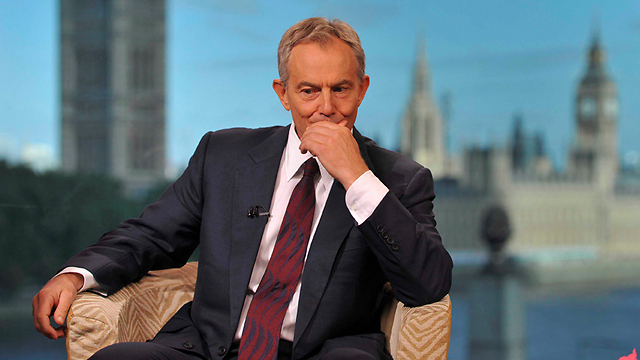
Photo: Reuters
צילום: רויטרס
Tony Blair quits as Quartet representative in Middle East
Announcement of Blair's resignation comes amid frustrations and failures for former PM; Palestinian official 'happy' to see him go.
Former British Prime Minister Tony Blair on Wednesday stepped down as the international community's Mideast envoy, leaving a post that began with great promise but which struggled to deliver dramatic changes in its quest to promote peace between Israel and the Palestinians.
The departure reflected the dire state of Mideast peace efforts, which have been stalled for years and show no signs of resuming following the formation of Prime Minister Benjamin Netanyahu's new government. A top Palestinian official said he was "happy" Blair was leaving, accusing him of ineffectiveness and caving in to Israeli pressure.
Officials familiar with the work of the Quartet in the region said Blair had written a letter to United Nations chief Ban Ki-moon to confirm his resignation. The officials spoke on condition of anonymity pending a formal announcement, which came later Wednesday once the letter was received and thanked Blair for his service.
Western diplomatic sources said that two factors within the Quartet had pushed Blair to resign. The first was the feeling that he work was ineffective and that he had lost credibility in the region. The second was criticism in the international community that his activity as an emissary of the Quartet was contrary to his business interests with some governments in the Middle East. Obama administration officials also said in the past that Blair was no longer an asset.
The Quartet - which includes the US, the European Union, Russia and the United Nations - appointed Blair to the post in 2007 with the goal of helping develop the Palestinian economy and institutions. The mission was meant to prepare the groundwork for the establishment of a Palestinian state alongside Israel as part of a peace agreement, and the addition of the high-profile Blair gave the office star power and raised hopes for progress.
But Blair quickly found himself fighting small battles with Israel over the movement of Palestinian goods and people in the West Bank, and dealing with the difficulties of a Gaza Strip ruled by the Hamas militant group and blockaded by Israel and Egypt. Hamas, which is shunned as a terrorist group by the US and EU, seized control of Gaza from the rival government of Palestinian President Mahmoud Abbas shortly before Blair took office.
When Blair first took office, then-Israeli Prime Minister Ehud Olmert and Abbas were conducting a round of peace talks that both sides have said made significant progress. But those talks ultimately failed, and since Netanyahu's election in 2009, repeated attempts at reviving talks have flopped. Netanyahu's new government is dominated by parliamentary hard-liners who oppose Palestinian independence, leaving the goal of a two-state solution as elusive as ever.
One official said Blair had suffered "frustration" with the limited authority of his mandate, which did not include a political role. The official also said that Blair felt his office has a strong leadership team and that now is the right time to move on.
A statement by the Quartet did not reveal why he was stepping down, but praised Blair's "unwavering commitment" to peace and said Blair made "lasting contributions" to improve the lives of Palestinians in the West Bank and the Gaza Strip.
US State Department spokesman Jeff Rathke said Blair had worked "tirelessly and passionately." He said he was not aware of plans to replace Blair.
According to his office's website, Blair's office succeeded in helping remove dozens of Israeli checkpoints in the West Bank, easing the movement of workers and Palestinian products to markets. He also helped boost tourism in the West Bank town of Bethlehem, helped secure thousands of permits for Palestinian laborers to work in Israel, helped engineer a $350 million mobile phone investment in the West Bank, creating thousands of jobs and also pressed Israel to allow limited exports out of blockaded Gaza.
Blair's part-time position was unpaid. As he coupled the job with a lucrative private-sector career, the Palestinians often complained that he was ineffective and caved in to Israeli demands too easily.
"I'm happy that Tony Blair is leaving. For the entire eight years, Tony Blair didn't make any contribution to Palestine," said Nabil Shaath, a senior Palestinian official. "He never proposed anything that the Israelis didn't agree to, and the entire time he only represented himself. And he worked only to satisfy the Israelis and the Americans."
Netanyahu's office declined to comment.
The official said that Blair's resignation would go into effect in June, but that he hopes to play an "informal" role in promoting the Quartet's vision of a two-state solution. One area where he could help is developing relations between Israel and the wider Arab world, the official said.












